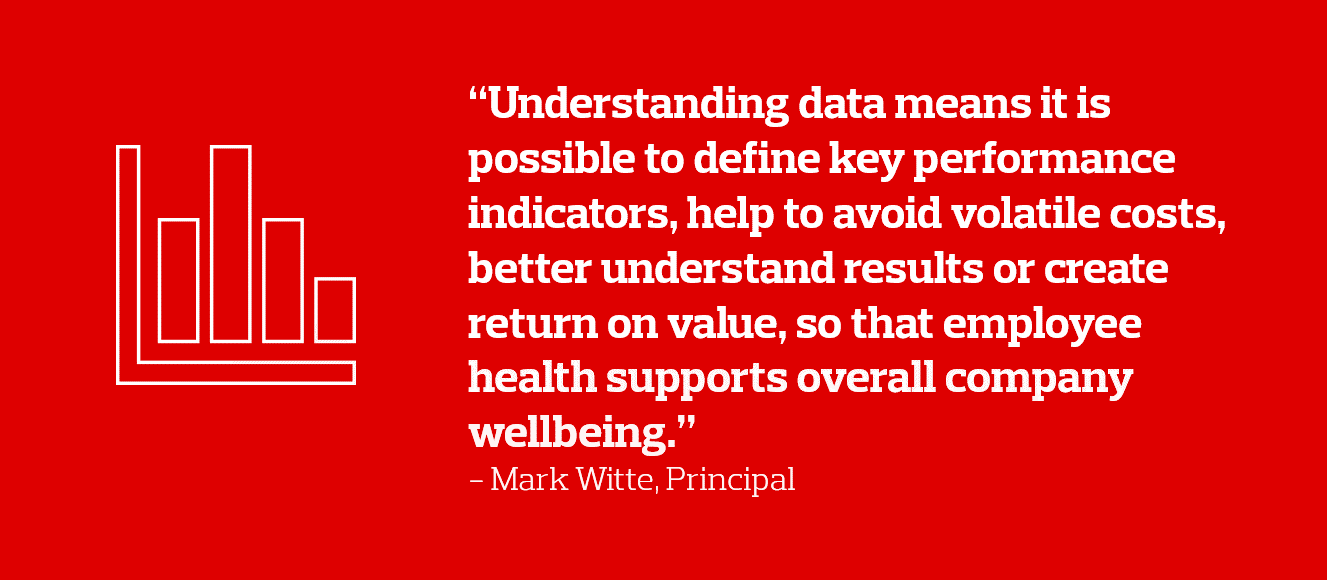- Ignoring outcomes of employee wellbeing can create challenges for employers
- The 2019 Benefits and Trends survey shows 80% of employers are looking to improve awareness and education
- Understanding data enables KPIs to be set – and a better understanding of results

By nature, wellbeing is a complex issue. Incorporating a range of factors – such as physical health, mental health and financial wellbeing – it’s highly individualised. Therefore, companies need to ensure that their wellbeing strategy is inclusive and that programmes are not siloed. In order to gain the best outcomes from wellbeing programmes, employers need to ensure that:
- 1) The strategy aligns with business goals
- 2) The programme resolves key employee issues
Ignoring the outcomes of employee wellbeing can create long-term challenges for employers – including poor health behaviours and chronic medical conditions. These manifest in different ways, including increased absenteeism and presenteeism, reduced productivity, increasing claim costs, poor financial wellbeing, and general disengagement.
Understanding business goals
Invariably, organisations have goals for their wellbeing strategy. Whether it’s a tick-box exercise, a method for cost avoidance, or because health is central to company values, having a clear understanding of the ‘why’ behind implementing your programme is critical to success and tangible results.
Our whitepaper, Prevention Is Better Than Cure, shows that 95% of employers see a correlation between employee health and performance – and believe they have a role in trying to educate and improve poor lifestyle behaviours. However, less than half of the companies surveyed have a defined health strategy.

Aligning your wellbeing approach to your business goals for absence, benefits, employee retention and talent attraction will help businesses prioritise focus areas. Mark Witte, principal at Aon adds that “in recent years, there has been a significant increase in awareness about employee wellbeing - for physical, financial, emotional and social health. Given the increased awareness, as well as the impact and volatility on benefit spend associated with health conditions such as cancer, organisations are advised to understand the key reasons to support employee wellbeing.”
Align to employees needs
Wellbeing is inherently personal. Therefore, you need to align your wellbeing programme to the individuals within your business.
“Our advice is to use data to analyse the issues that are unique to an individual business, then to ensure full consideration is given to four key stages of wellbeing: prevention and education, detection and early intervention, access to treatment and long term support. The mantra ‘prevention is better than cure’ holds true in employee benefit programmes”.
- Mark Witte
Our latest Benefits and Trends Survey highlighted a shift in focus in employer’s strategies, with 80% stating they were now looking to improve wellbeing awareness and education. Although it bodes well for preventative conditions that companies are shifting approach, businesses need to ensure they remain employee-focused; is the preventative support easily accessible? Do employees know about it? Just over a quarter (26%) of employers say they focus on providing education, but only 8% have resource for detection – although employers are more focused when it comes to access to treatment (30%) or long-term support (30%). However, 70% of companies spend less than £5k on communicating benefits and health/financial wellbeing; it’s likely that some underperforming benefit schemes and wellbeing programmes are due to lack of exposure rather than perceived worth or irrelevance.

For more information or to discuss any of the issues outlined in this article, please get in touch by emailing us at [email protected] or call us on 0344 573 0033.
Aon UK Limited is authorised and regulated by the Financial Conduct Authority. Registered in England and Wales. Registered number: 00210725. Registered Office: The Aon Centre, The Leadenhall Building, 122 Leadenhall Street, London EC3V 4AN.